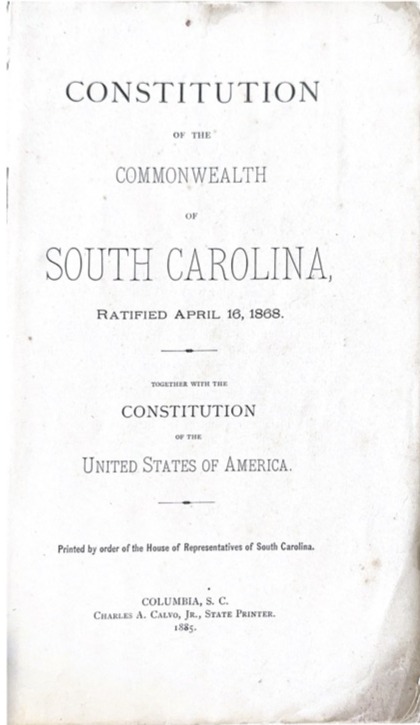In April of 1868, men of all races in South Carolina got the chance to do something they never have before or since – vote in a public referendum on the state constitution.

Cover of pamphlet containing the Constitution of the Commonwealth of South Carolina together with the Constitution of the United States of America. From the collections of the South Carolina Historical Society.
Things changed quickly after the end of the Civil War. Republicans, the political party of Abraham Lincoln, were in the majority in the U.S. Congress and led the effort known as Reconstruction, establishing and protecting civil rights for newly freed people in the South, forbidding discrimination based on race, and allowing Black men to vote and hold political office.
By 1867, all Southern states, except Tennessee which had already ratified the 14th amendment, were under martial law. In March of that year, Congress ratified “An Act to Provide for the More Efficient Government of the Rebel States,” which laid out the requirements for these states to reestablish state governments. The act required that all male citizens – no matter their race – be allowed to vote for delegates to a state constitution convention; that the new constitutions be approved by the U.S. Congress and allow all males to vote in subsequent elections; and that each state must ratify the 14th amendment. Only once all these requirements were met could a Southern state be re-admitted to the Union and begin to rule itself again.
At the time, some Confederate supporters had lost their homes and land and become outnumbered by newly free African Americans and liberal Northerners who had moved South, derided as “carpetbaggers.” This tipped the balance of power towards the Republican party. Soon, elected representatives across the South were no longer only white, land-owning Democrats but Southern Black or Northern white Republicans.
In accordance with Congress’s act of March 1867, all South Carolina males were able to go to the polls and vote on whether to hold a constitutional convention and who their area delegates would be. A convention was approved, with more than 70 Black delegates and more than 40 white delegates. At the beginning of 1868, the delegates began meeting in Charleston and by March, they had re-written the South Carolina Constitution including provisions allowing any male 21 or over to vote regardless of education or property holdings, mandating that public education be open to children of all races, abolishing prison for those in debt, and making divorce legal – a win for women.
In April 1868, South Carolina voters again went to the polls, this time to vote on what the delegates had drafted. They also voted for new representatives in the state government, and once the new constitution was approved by voters and those newly elected state congressmen convened to ratify the 14th amendment of the U.S. Constitution, South Carolina was officially accepted back into the Union.
For some, the new laws were considered too radical and, as more conservative white residents trickled back into the state, they pushed back against those who were now in power. Even though the 1868 constitution was approved by the popular vote, it did not last long. By 1874, the more conservative Democrats had taken back control of the U.S. Congress, and the Republicans in power had begun to divide on the issue of how far Reconstruction should go. South Carolina, however, was one of three Southern states to still have a Republican-led state government in 1876. When Rutherford B. Hayes won the presidential election by agreeing to remove federal troops from the South, the end of Reconstruction was official everywhere.
By 1895, extremely conservative Democrat Benjamin Tillman had already served as governor and was now a senator. He had long wanted a convention to re-write the state constitution to disenfranchise Black voters and this year, he got his chance, with only six Black delegates. The 1895 constitution created many requirements to vote, including the length of residency, poll taxes, and literacy tests or property ownership. Literacy tests would stay in place in our state until the federal Voting Rights Act of 1965.